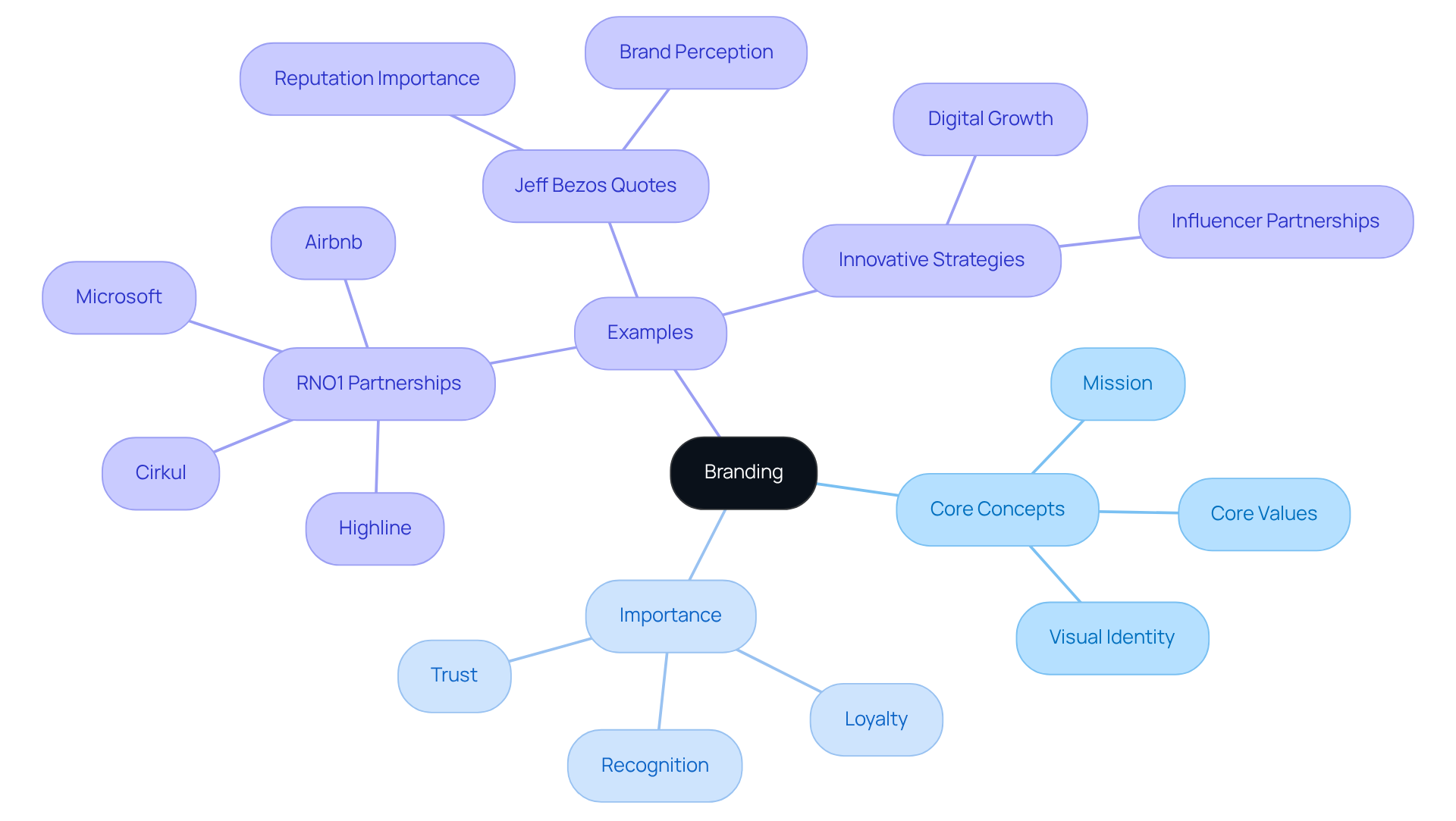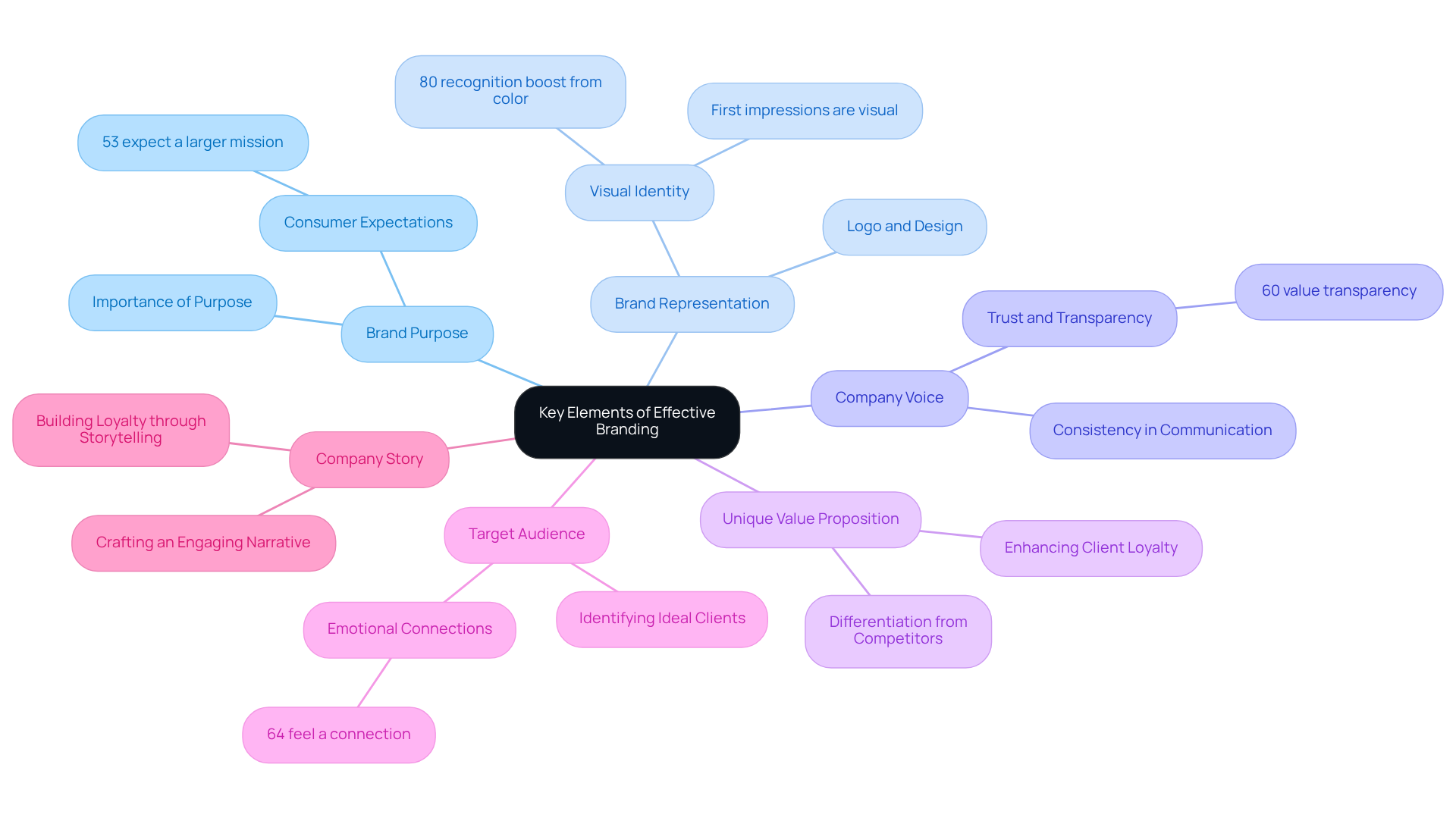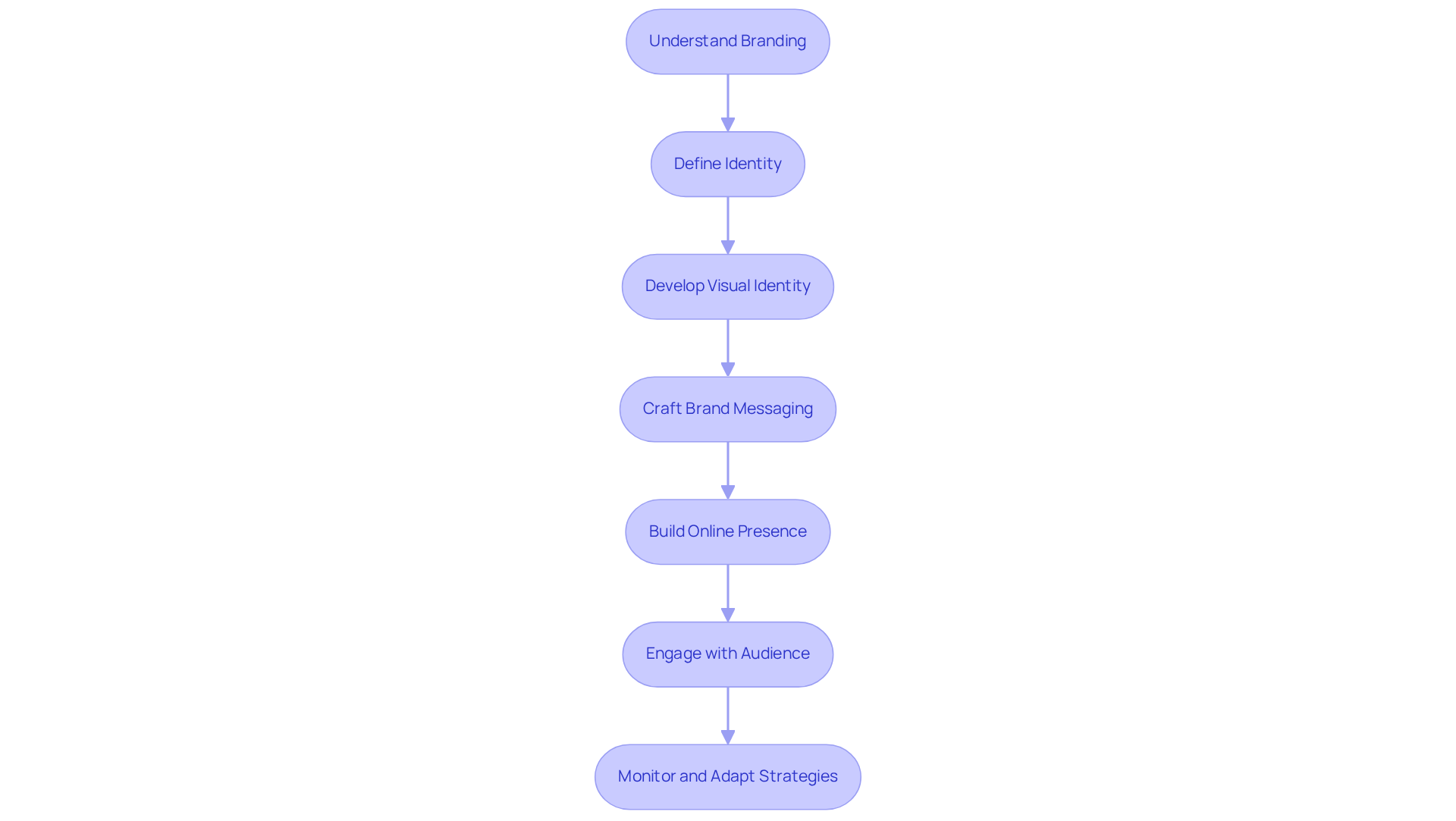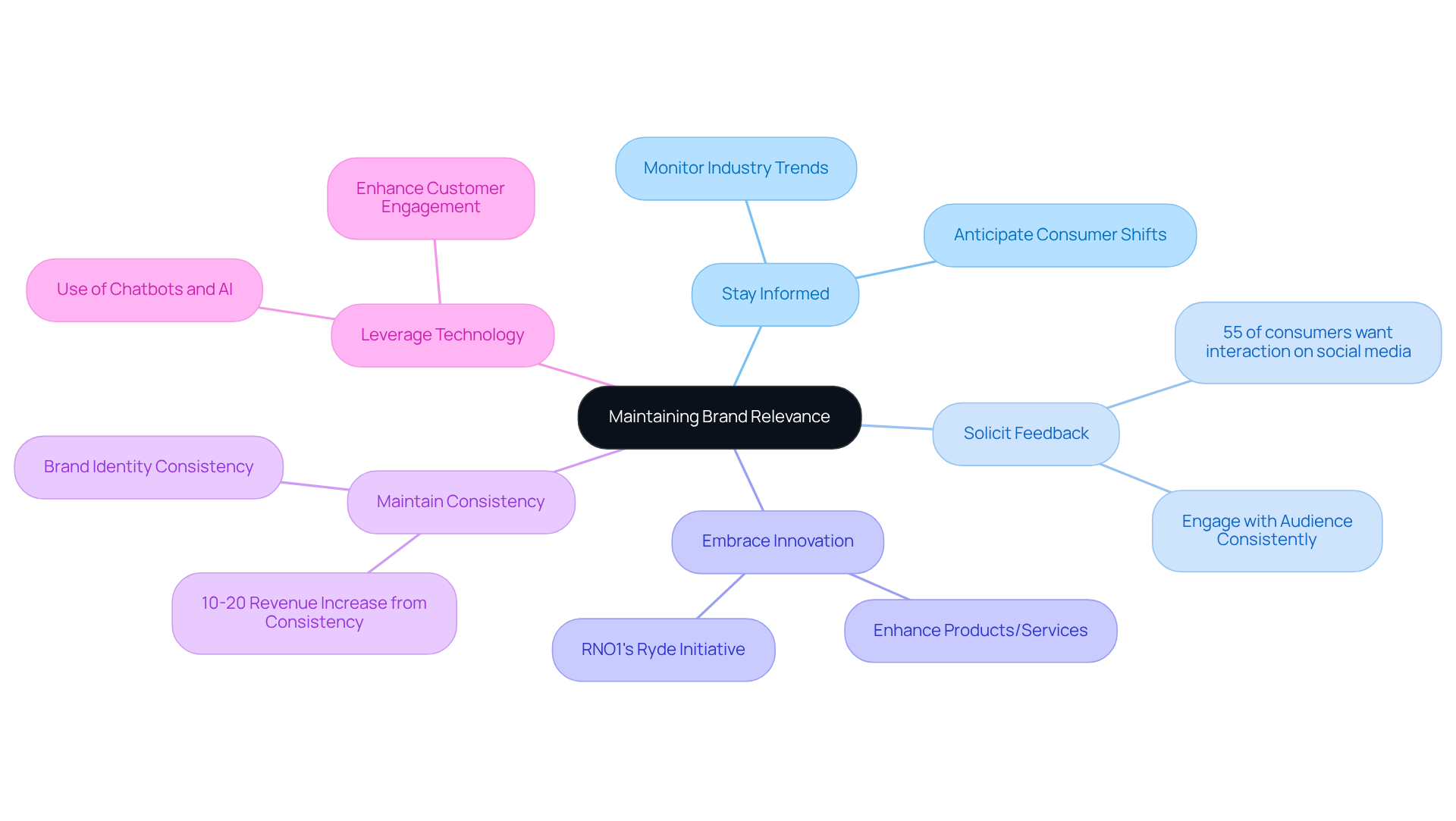Overview
Branding for tech startups can often feel overwhelming, as establishing a distinctive identity is crucial for connecting with your target audience. This connection is what fosters the customer loyalty and trust that every startup strives for. It’s essential to recognize that effective branding isn’t just about a logo or a catchy tagline; it involves articulating a clear purpose that resonates deeply with your audience. Imagine the relief of knowing that your brand speaks to the heart of your customers, creating a bond that encourages them to return.
However, many founders struggle with this task. The implications of not having a strong brand can lead to confusion in the marketplace, making it difficult to stand out in a sea of competitors. This can be disheartening, especially when you’re pouring your heart and soul into your startup. You may feel like you’re constantly adapting to market changes without a clear identity to anchor your efforts. It’s a painful reality that many face, but it doesn’t have to be your story.
The good news is that there is a path forward. By focusing on creating a strong visual identity and maintaining consistent communication, you can navigate this challenging landscape with confidence. These elements are not just strategies; they are your tools for building a brand that reflects your mission and values. Remember, you’re not alone in this journey. Many have walked this path before you, and with the right support, you can cultivate a brand that truly resonates with your audience. Let’s embrace this opportunity together, turning challenges into stepping stones for success.
Introduction
Branding can often feel like an overwhelming obstacle for tech startup founders. Yet, it is the cornerstone of distinguishing oneself in a crowded marketplace. By nurturing a strong brand identity that truly resonates with your target audience, you can foster trust, loyalty, and recognition—elements that are vital for your success.
But what happens when the core of your brand needs to evolve to meet the ever-changing expectations of consumers and the dynamics of your industry? This article explores the fundamental concepts and strategies of branding, offering insights into how tech startups can not only define their identity but also adapt and flourish in a continually shifting landscape.
Remember, you are not alone in this journey; together, we can navigate these challenges and find a path forward.
Define Branding: Core Concepts and Importance
Branding can feel like a daunting challenge for many tech startup founders. Establishing a distinctive identity that truly resonates with your target audience is crucial, yet it often seems overwhelming. This process encompasses essential elements such as your company's mission, core values, and visual identity. Without a , you risk blending into a competitive landscape, where trust and loyalty are hard to come by. A robust brand not only enhances recognition and recall, but it also simplifies the decision-making process for your potential customers, guiding them toward choosing your product over others.
Consider how RNO1 exemplifies this through its strategic partnerships with industry leaders like Microsoft and Airbnb. These collaborations have not only propelled substantial digital growth but have also sparked innovation in branding. For instance, RNO1's partnership with Amount resulted in a remarkable $100M funding win, showcasing the tangible outcomes of their innovative strategies. As industry leaders have pointed out, investing in a strong identity is one of the most important steps a business can take. It's about fostering enduring customer loyalty and standing out in the market.
Jeff Bezos once said, 'A label for a company is like a reputation for a person,' highlighting the importance of reputation in branding. Moreover, it's essential to remember that 'A product can be quickly outdated, but a successful brand is timeless.' This underscores the enduring value of a well-defined brand that goes beyond mere logos or slogans. RNO1's transformative client collaborations, such as with Interos and Cloud Apartments, illustrate how innovative strategies can elevate digital experiences and enhance e-commerce engagement through influencer partnerships.
Ultimately, the branding meaning lies in forging a meaningful connection with your audience, embodying your startup's core values and vision. It’s a journey worth taking, and RNO1 is here to support you every step of the way.

Explore Key Elements of Effective Branding
Effective branding is a journey that encompasses several essential elements, each crucial for technology startups navigating their unique challenges:
- Brand Purpose: It's vital to clearly articulate why your startup exists and the specific problems it seeks to solve. A well-defined purpose not only guides your decisions but also resonates with consumers. In fact, 53% of individuals expect small enterprises to have a greater mission behind their identity, creating a deeper connection.
- Brand Representation: This involves your logo, color palette, typography, and overall visual style, which together signify your identity. A strong brand identity is essential because the branding meaning contributes to more than half of first impressions being visual. Did you know that color can enhance recognition by up to 80%? For example, many technology companies choose blue in their branding to convey trust and reliability, fostering a sense of security.
- Company Voice: Establishing a consistent tone and style in your communications is key to reflecting your organization’s personality. This consistency builds trust, with 60% of consumers valuing transparency and trustworthiness as essential traits in their favorite brands. Your voice can create a nurturing environment that invites connection.
- Unique Value Proposition (UVP): It's important to clearly express what sets your product or service apart from competitors and why clients should choose you. A compelling UVP can significantly enhance client loyalty and their willingness to pay more, reinforcing the value you bring to their lives.
- Target Audience: Recognizing who your ideal clients are and tailoring your branding efforts to connect with them is crucial. When you effectively connect with your audience, you ; 64% of individuals feel a relationship with their preferred companies, underscoring the importance of this connection.
- Company Story: Crafting an engaging narrative that conveys your organization’s journey, mission, and values is essential. Storytelling helps forge an emotional bond with your audience, which is vital for building loyalty and advocacy.
By focusing on these essential components, technology startups can create a robust identity that conveys the branding meaning, attracting customers while nurturing long-term growth and loyalty. Remember, you are not alone in this journey; many have walked this path and found success by embracing these principles.

Implement Branding Strategies: Step-by-Step Guide
To implement effective branding strategies, it's essential to understand the branding meaning and recognize the challenges you may face. Many marketers prioritize developing awareness, yet a significant number struggle to create effective strategies. This can be disheartening, especially when 70% of marketers feel the pressure to stand out. At RNO1, we believe that understanding your market is the first step toward achieving branding meaning and differentiation. Conducting thorough market research allows you to analyze competitors and grasp market trends, which is vital for nurturing new concepts that stimulate growth in purpose-driven enterprises.
Next, defining your identity is crucial. Establishing your organization's mission, vision, and values is crucial as it helps clarify branding meaning, laying the foundation for all marketing efforts. After all, 76% of consumers prefer to purchase from companies they trust. By ensuring that these core principles are at the forefront of your identity design, RNO1 helps you establish the branding meaning that builds trust.
Developing your visual identity is another important step. Creating a logo and selecting a color palette and typography that reflect your company's personality can significantly impact how your audience perceives you. In fact, colors can enhance product recognition by as much as 80%. At RNO1, we focus on enhancing brand identity design to convey the branding meaning that resonates deeply with your target audience.
Crafting your brand messaging is where you can truly connect with your audience, highlighting the branding meaning behind your communication. Developing key messages that communicate your unique value proposition (UVP) is essential. Emotional branding meaning can increase customer loyalty by 37%, highlighting the importance of connecting with consumers on a deeper level. RNO1's content strategy emphasizes creating meaningful connections that enhance branding meaning and drive market adoption.
Building an online presence is vital in today's digital age. A professional website and active social media profiles aligned with your identity can enhance visibility and engagement. Social media serves as a cost-effective tool for promoting your narrative, and RNO1's go-to-market strategy includes leveraging digital platforms to strengthen your presence.
Engaging with your audience is where relationships flourish. Utilizing content marketing, social media, and other channels allows you to connect with your audience on a personal level. Personalized marketing resonates with 90% of US consumers, making it a powerful tool. Moreover, 64% of consumers feel more connected to brands that foster a community. At RNO1, we emphasize engagement as a critical element of successful marketing.
Finally, monitoring and adapting your strategies is essential for understanding the branding meaning necessary for long-term success. Regularly evaluating your marketing efforts and being open to adjustments based on feedback can lead to a revenue increase of 10-20%. RNO1's commitment to staying attuned to trends and insights ensures that the branding meaning remains relevant and impactful. Together, we can navigate these challenges and create a that truly reflects your vision.

Adapt and Evolve: Maintaining Brand Relevance in a Changing Market
In today's rapidly changing market, many tech startup founders find that maintaining brand relevance requires a clear understanding of branding meaning. It's a challenge that can stir anxiety, as shifts in consumer preferences and industry trends may threaten your hard-earned reputation. However, by embracing a few thoughtful strategies, you can navigate these changes with confidence and care, which will also enhance your understanding of branding meaning.
First and foremost, staying informed is crucial. Regularly monitoring industry trends and consumer preferences allows you to anticipate shifts before they become critical. This proactive approach empowers you to adapt and ensure the branding meaning of your brand remains relevant.
Additionally, soliciting feedback from your customers can provide invaluable insights into their needs and perceptions. Engaging with your audience consistently fosters open communication, which is vital. Research shows that 55% of consumers want companies to interact with them directly on social media, underscoring the importance of connection.
As your audience evolves, so should the branding meaning of your messaging. Be prepared to adjust your communication to align with their changing values and expectations. Brands that successfully forge emotional connections can see a remarkable 96% increase in conversion rates, demonstrating the importance of branding meaning. Moreover, 76% of consumers are more inclined to purchase from companies that reflect strong branding meaning, highlighting the significance of relevant messaging.
Innovation is another key aspect. Continuously seek ways to enhance your products or services, ensuring they meet your customers' changing demands. Companies that prioritize innovation are better positioned to thrive in competitive markets. For instance, RNO1's Ryde initiative exemplifies this by expanding omnichannel ambassador programs that promote community involvement and leverage influencer collaborations to boost e-commerce success.
While adapting, it’s essential to maintain consistency in the branding meaning of your brand identity. Unreliable marketing can confuse your audience and diminish trust, which is vital for client loyalty. Focus on consistency in your core identity, as it can enhance your branding meaning and bolster revenue by 10-20%.
Lastly, leverage technology to enhance client engagement and streamline your branding efforts. With more than half of companies , adopting these tools can significantly improve customer interactions and satisfaction. RNO1's approach to developing sales funnel sequences and supporting influencer onboarding strategies showcases how technology can enhance brand ambassador programs.
As Natalya Jaime wisely states, "Branding is no longer just about logos, catchy taglines, and color schemes. Today, successful branding is about creating an emotional connection, delivering on promises, and establishing trust with consumers." By embracing these strategies, you can foster a nurturing environment for your brand, ensuring it maintains its branding meaning and remains relevant and connected to your audience.

Conclusion
Establishing a strong brand identity can feel overwhelming for tech startups striving to stand out in a crowded marketplace. It's not just about creating logos or catchy slogans; it's about articulating a clear mission, embodying core values, and building genuine connections with your audience. By prioritizing branding, you can enhance recognition, nurture customer loyalty, and ultimately drive growth.
Key concepts like brand purpose, representation, voice, and unique value proposition are essential in shaping your startup's identity. Understanding your audience and crafting a compelling narrative are vital steps in this journey. Furthermore, implementing effective branding strategies—from market research to maintaining consistency—ensures that you remain relevant in an ever-changing environment. The stories of successful collaborations and innovative approaches serve as a testament to the tangible benefits of investing in branding.
In our increasingly digital world, the importance of branding is profound. As a tech startup, embracing these principles and strategies can help you navigate challenges and forge lasting relationships with your customers. By creating emotional connections and staying attuned to market shifts, you can not only survive but thrive, ensuring that your branding resonates deeply with your audience. Remember, you are not alone in this journey; together, we can build a brand that truly reflects your vision and values.
Frequently Asked Questions
What is branding and why is it important for tech startups?
Branding is the process of establishing a distinctive identity that resonates with your target audience, encompassing your company's mission, core values, and visual identity. It is important for tech startups because a strong brand enhances recognition, builds trust and loyalty, and simplifies the decision-making process for potential customers.
How can a strong brand impact customer loyalty?
A robust brand fosters enduring customer loyalty by creating a meaningful connection with the audience and embodying the startup's core values and vision. This connection encourages customers to choose your product over competitors.
What are some examples of successful branding strategies?
RNO1 exemplifies successful branding through strategic partnerships with industry leaders like Microsoft and Airbnb, which have driven digital growth and innovation. Their collaboration with Amount led to a significant $100M funding win, showcasing the tangible benefits of effective branding strategies.
What did Jeff Bezos say about branding?
Jeff Bezos stated, "A label for a company is like a reputation for a person," emphasizing the importance of reputation in branding. He also noted that "A product can be quickly outdated, but a successful brand is timeless," highlighting the lasting value of a well-defined brand.
How can branding enhance digital experiences and e-commerce engagement?
Innovative branding strategies, such as those employed by RNO1 in collaborations with clients like Interos and Cloud Apartments, can elevate digital experiences and enhance e-commerce engagement through influencer partnerships, making the brand more relatable and appealing to customers.
What is the ultimate goal of branding for startups?
The ultimate goal of branding for startups is to forge a meaningful connection with the audience while embodying the startup's core values and vision, helping to differentiate the business in a competitive landscape.




